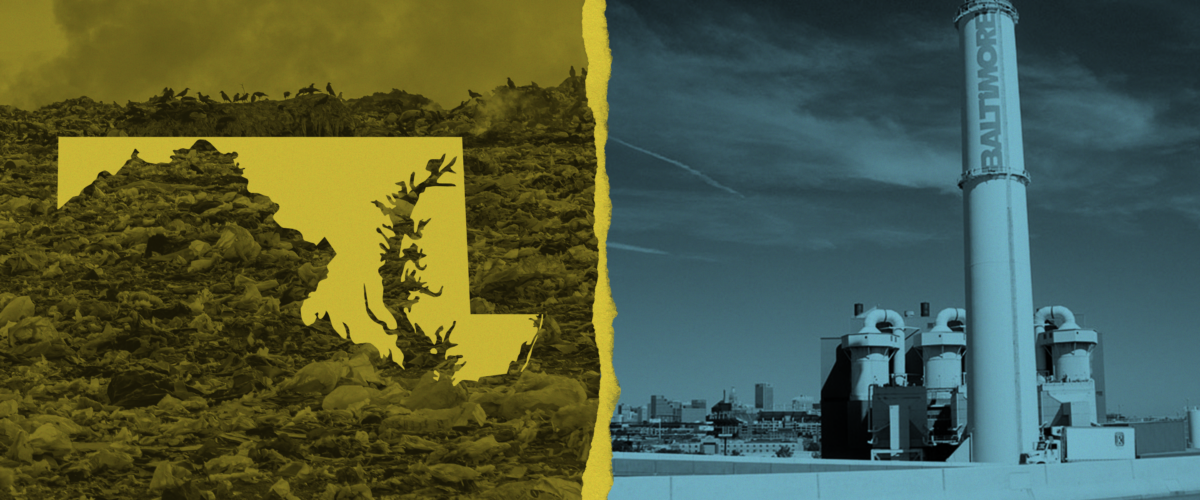How Marylanders Pay for Pollution in their Backyards
Published Mar 1, 2023

Maryland’s Renewables Portfolio Standard is supposed to promote clean energy. Instead, it’s paying polluters with ratepayer funds.
In our time of climate crisis, several states have stepped up with plans and laws to cut their climate pollution. But many of these policies hide incentives that only help dirty companies and industries.
Take Maryland’s Renewables Portfolio Standard: for years, the program has allowed polluters to reap benefits meant to encourage clean energy. In fact, 35% of the state’s “clean” energy came from dirty sources in 2020. Even worse, these benefits were funded with ratepayers dollars.
Maryland’s RPS has subsidized dirty energy for far too long. So now, Food & Water Watch is working to change that. Here’s what you need to know:
Maryland’s RPS Lets Polluters Reap Rewards From Rates
Since 2004, Maryland has used a Renewables Portfolio Standard (RPS) to try and clean up its energy grid. The program currently mandates that utilities get 50% of their power from “renewable” sources by 2030.
However, its definition of “renewable” has included several dirty options, including trash incineration, woody biomass, and factory farm gas.
These energy sources are far from green, clean, or renewable. For instance, factory farm gas, made from factory farm waste, is chemically identical to fracked gas. Moreover, a boost for factory farm gas means a boost for the factory farm model that has ravaged communities and the climate for decades.
At the same time, the RPS provides benefits to out-of-state polluters. Under the program, Maryland utilities can reach their “renewable” energy quotas by buying credits from supposedly green sources. But those credits have subsidized polluting paper mills, factory farms, landfills, and more, from Kentucky, to Ohio, to Virginia.
To make matters worse, utilities pass the costs of these credits on to their energy customers. In 2020 alone, 36 million ratepayer dollars went to dirty energy masquerading as clean. If the current RPS remains unchanged, Marylanders will have spent roughly half a billion dollars subsidizing dirty energy by 2030.
Maryland’s Current RPS Won’t Fight Climate Change
The whole point of the RPS is to clean up Maryland’s energy mix. But by incentivizing dirty sources like factory farm gas (so-called “biogas” by the industry), it totally misses the mark.
Despite what boosters may tell you, factory farm gas is terrible for the climate and the environment. That’s because it’s made from the obscene amounts of waste produced by factory farms.
Maryland is home to hundreds of huge poultry farms, whose waste is a boon to factory farm gas operations. At gas facilities, wood, hatchery waste, excrement, and more are funneled into a digester. Inside the digester, microorganisms eat the waste and produce a mixture of gases.
That mixture is mostly methane — a climate super polluter with 80 times the climate impact of carbon dioxide.
Poultry waste by itself doesn’t release a lot of climate pollution. Only when it’s processed through digesters does all that methane come out. Once extracted, the methane flows through the typical gas supply chain, which is notoriously leaky and dangerous to human health. Then it’s burned for energy, causing the same climate pollution as fracked gas.
Factory farm gas is far from a climate solution. On top of its emissions, it incentivizes more fossil fuel infrastructure, like gas hookups and pipelines. It also encourages more and bigger polluting factory farms to profit off the waste.
The RPS Doubles Down on Dangerous Pollution
Climate pollution is far from factory farm gas’s only problem. It also imposes many harms on nearby communities. For instance, factory farm gas facilities bring air pollution like smog-forming nitrogen oxides, ammonia, and hydrogen sulfide. These pollutants are linked to chronic lung disease, asthma, and other respiratory illnesses.
Additionally, after extracting the gas, factory farm gas facilities are still left with solid waste, which they typically apply to fields. Rich in pollutants, that waste often leeches into waterways and has contaminated drinking water.
This air and water pollution disproportionately impacts low-income communities and communities of color, who often contend with factory farms right in their backyards.
Similarly, trash incineration — another “clean” energy under Maryland’s RPS — poses huge environmental and public health risks that especially burden people of color.
For example, the city of Baltimore has burned its trash for decades. The trash incinerator in South Baltimore is one of the top sources of pollution in the city, already one of the most polluted in the country.
Trash incineration releases toxic chemicals like mercury, lead, and hydrochloric acid into the air. It also produces smog- and acid rain-forming nitrogen oxides and sulfur oxides.
This adds to existing pollution in the area, sources of which include huge highways and a coal exporting port. As a result, South Baltimore’s predominantly Black residents face lowered life expectancies and higher asthma rates.
We’ll Repair Maryland’s RPS, With Your Help
If Maryland is to transition to truly clean energy, we need to fix the RPS. That’s why Food & Water Watch is supporting the Reclaim Renewable Energy Act in the state legislature this year.
Under this Act, trash incineration, factory farm gas, and woody biomass would no longer count as “renewable” under the RPS. The Act would stop a huge incentive for dirty industries to harm communities in the state.
It would end public incentives for dangerous pollution from incineration and factory farms; for environmental injustices that have plagued communities for decades. And, the Act would clear the way for real clean energy, like wind and solar, to grow under the state program.
Marylanders, tell your lawmakers to Reclaim Renewable Energy now!
Enjoyed this article?
Sign up for updates.
TO TOP


